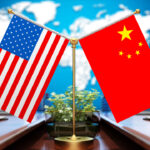The US appears to be increasingly inclined to use non-market means to dodge market competition. An addiction to this approach may backfire.
US Commerce Secretary Gina Raimondo warned that Chinese-made electric vehicles (EVs) pose significant national security risks, as the Biden administration weighs additional tariffs on autos from the Asian country as well as a separate measure to protect Americans’ personal information, Bloomberg reported on Wednesday.
The commerce secretary’s overstretching of the security concept is an unmistakable sign of Washington’s attempt to target Chinese EVs, even though Chinese EVs have not entered the US market on a large scale.
Her remarks came against the background of China overtaking Japan as the largest auto exporter in 2023, a milestone for the internationalization of China’s vehicle industry.
Japan exported 4.42 million vehicles in 2023, according to data released by the Japan Automobile Manufacturers Association on Wednesday, The Japan Times reported. That compared with 4.91 million vehicles shipped from China, according to the China Association of Automobile Manufacturers (CAAM).
Under such circumstances, there is little doubt about the expectations that Chinese EVs will eventually reach all major global markets such as the US and Europe. Such a trend is inevitable, as it is determined by Chinese manufacturing capability.
Chinese EV firms don’t necessarily need to create trade imbalances by exporting on a large scale. Carmakers can cooperate with foreign capital to build factories overseas and produce near the target markets.
Chinese EV makers rely on their production efficiency and technological progress to win the market, which is good for global consumers, including those in the US and Europe. What Chinese EV makers have done is in line with global trade and market norms, just like their Western peers have done over the decades.
The US appears to be playing dirty by labeling Chinese EVs as “national security risks,” an excuse the US often uses to suppress Chinese companies or industries without offering any evidence.
It is not hard to see that the real nature of the US overstretching the concept of security is protectionism, with the purpose of protecting its own industries to maintain its hegemonic interests while containing others’ competitiveness.
But can protectionism serve this purpose, and will it consolidate or weaken US EV makers’ competitiveness?
At least based on past international economic and trade practices, no industry’s vigorous development can be achieved by tariffs or other trade restrictions. On the contrary, the decline of many industries is often related to a country’s protectionism.
Also, the US attempt to spread claims of a “China threat” in the global EV market is again aimed at containing China’s development by blocking the strong momentum of Chinese EVs, which highlights its growing hegemonic anxiety over its own EV manufacturing.
It is not the first time for the US to abuse the security concept to attack Chinese manufacturing. Such a practice seriously undermines the market economy and the principle of fair competition, disrupting the international economic and trade order, and posing a major threat to the security of global supply and industry chains.
What US politicians need to be reminded of is that China is also a big market for cars, and its importance to American carmakers has been on the rise in recent years.
Meanwhile, the Chinese government has opened its market wide for various foreign carmakers, which are now allowed to set up local factories with 100 percent ownership. Instead of weakening its auto industry, China’s opening-up has made it even more competitive. China’s openness to American carmakers should make these US politicians blush.
We are not opposed to economic competition, which is natural in itself, but we are opposed to the use of unfair means to suppress rivals. If the US really wants to compete and win, then it should do so in a fair manner, not in a shady way.
(Global Times)




